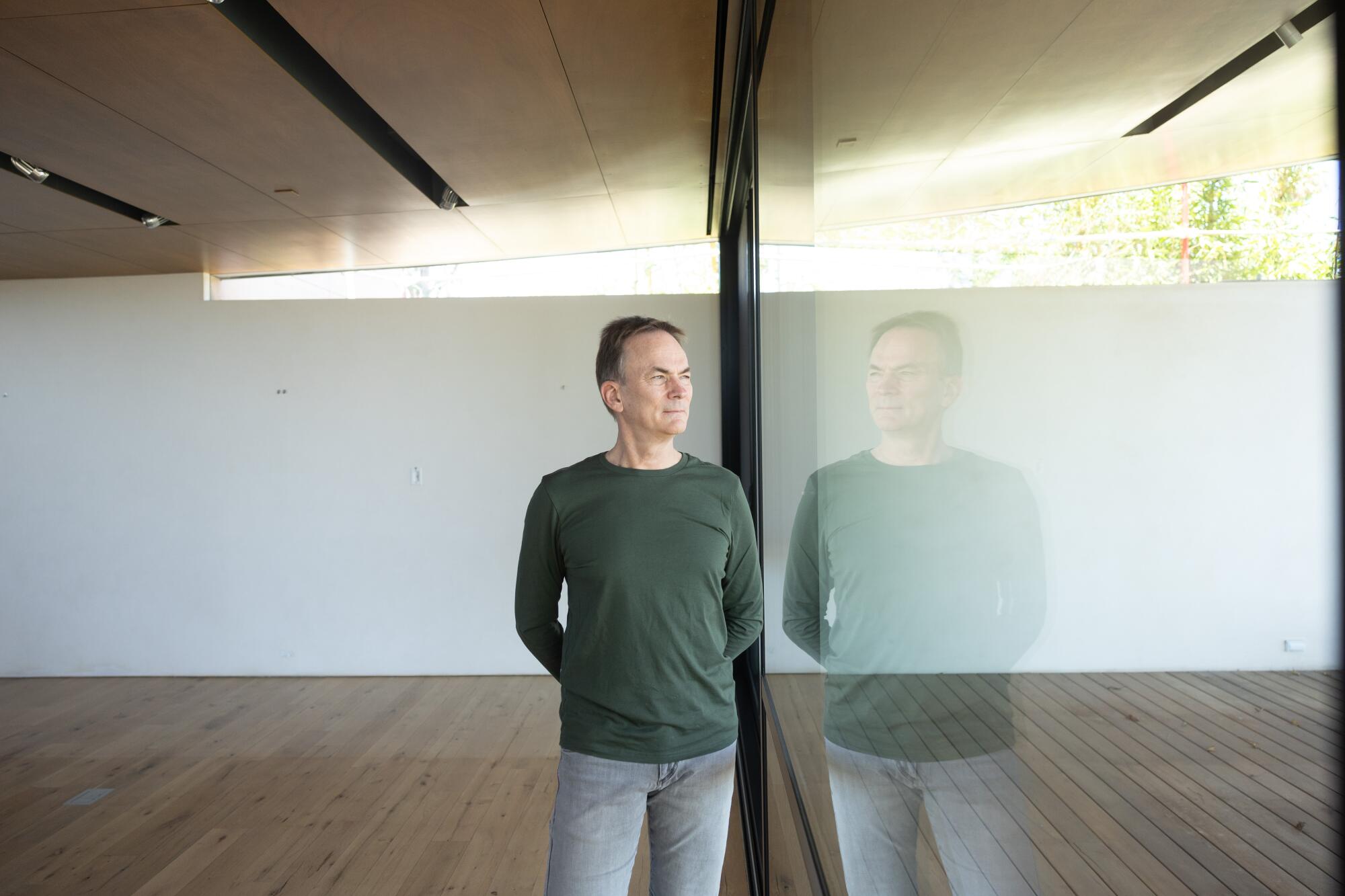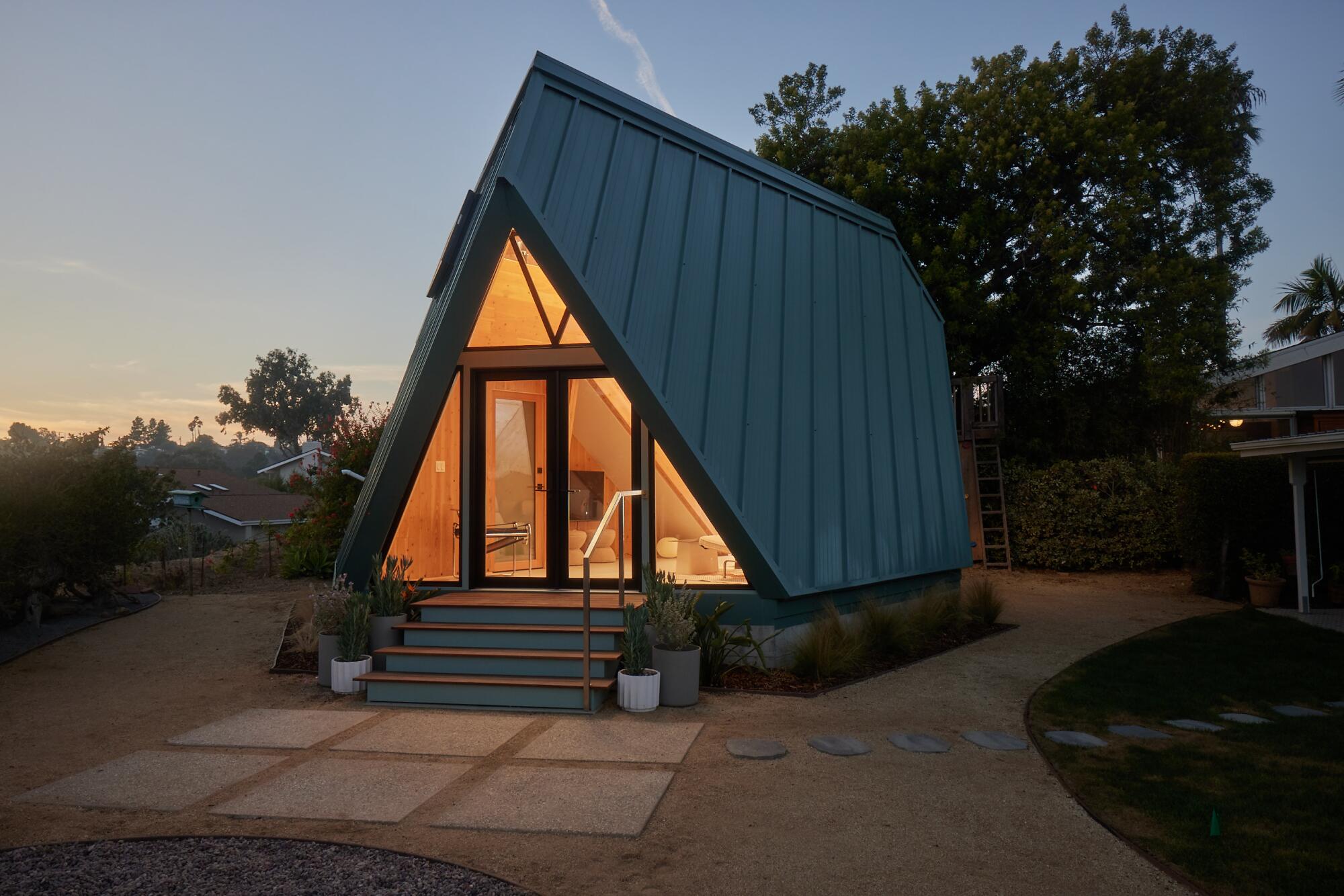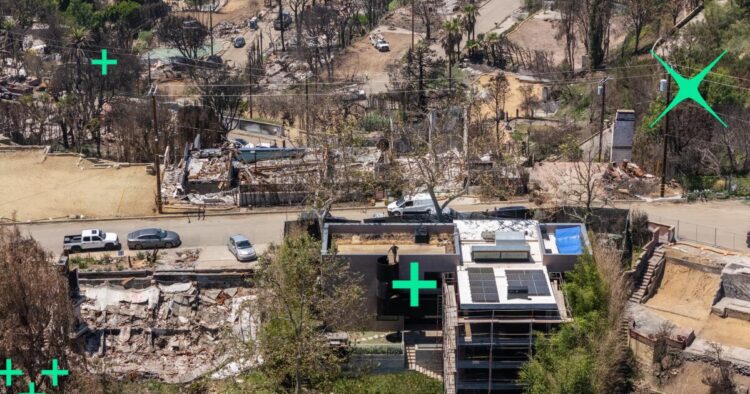Twenty-five years from right this moment, Santa Ana winds will scream by Los Angeles on a dry autumn morning, turning a small hillside campfire right into a lethal, fast-moving blaze.
At that second, the town will spring into motion.
Satellites will staff up with anemometers, pairing stay aerial footage with wind patterns to inform firefighters precisely the place the hearth goes. Fleets of autonomous Black Hawk helicopters and unmanned air tankers will fill the skies, dropping fireplace retardant within the path of the flames.
Wearable applied sciences will information us within the metropolis under: “ALERT: A wildfire has been noticed 2.4 miles out of your location and can attain your location in roughly 43 minutes.” Angelenos will obtain a stay satellite tv for pc map of the blaze’s trajectory and instructions for a protected evacuation.
Folks in threatened neighborhoods will rapidly run by to-do lists: shut vents, test on neighbors, and so forth. Some renters and householders will arm fire-retardant sprayers on their roofs and jam valuables into fireproof ADUs tucked of their backyards. Others can have outfitted their super-smart properties with expertise that cuts down on decision-making for a good faster get-away. Condo security groups will comply with their well-rehearsed plans to make sure evacuation.
Then, everybody will comply with their group evacuation plan by driving their electrical automobiles or ride-sharing to security, eased alongside by a gentle circulate of inexperienced lights programmed by the town to divert all site visitors away from the hearth. Fleets of self-driving vans will circle again by the neighborhoods, selecting up any stranded residents.

Michael Kovac’s home stands amongst burned properties in Pacific Palisades.
(Myung J. Chun / Los Angeles Occasions)
The situation might sound inconceivable, however based on firefighters, architects and futurists, it’s a sensible define of what L.A.’s fireplace protection may appear to be in 2050.
Devastating fires have pummeled Southern California within the final a number of many years, shifting the general public dialog from fireplace suppression to fireside preparedness and mitigation as governments begrudgingly acknowledge the disasters as common occurrences. Within the wake of the lethal January fires that burned by Altadena and Pacific Palisades, many individuals are questioning: Can we actually fortify our metropolis in opposition to a firestorm?
:
Architect Michael Kovac thinks we will. Kovac, a Palisades resident whose purchasers embody celebrities, constructed his house to be fire-resistant realizing that, sooner or later, it will be topic to a firestorm.

Michael Kovac designed his house in Pacific Palisades The home is clad in fiber cement; the roof is made from fireproof TPO (thermoplastic polyolefin); the deck is made with specifically handled wooden for fireplace resistance; and a fireplace suppression system behind the home sprayed fireplace retardant onto the vegetation.
(Myung J. Chun / Los Angeles Occasions)
On Jan. 7, his total avenue burned, however his home survived. Now, it serves as a blueprint for fireplace resistance. “We constructed it to have the ability to stand up to a small fireplace,” Kovac stated. “We by no means imagined our entire group could be erased.”
Kovac’s house is wrapped in fire-resistant fiber cement-panel siding. The inexperienced “residing” roof is topped with grass and greater than 4 inches of fire-resistant soil. The home windows characteristic three panels of quarter-inch glass, which reduce the opportunity of breakage within the face of scorching temperatures and shield the inside from radiant warmth — one of many main methods fires can enter a house.
Earlier than fleeing the hearth, Kovac loaded all his valuables right into a room wrapped in concrete and outfitted with a fireplace door able to retaining out smoke and flames for 3 hours. He monitored the blaze from afar utilizing safety cameras. Because the flames approached, he activated three sprinklers that sprayed fireplace retardant alongside the perimeter of the property, retaining the hearth at bay.
Hearth-proofing safeguards typically aren’t low cost. Hearth-proof doorways run from a number of hundred {dollars} into the hundreds, and fire-retardant sprinklers can value tens of hundreds of {dollars}, relying on the system. However Kovac additionally put in some DIY upgrades for subsequent to nothing, together with dollar-store mesh screens on all his vents to dam embers from coming into — one other frequent reason behind fires spreading.
Each enchancment helps, however the harsh actuality of the following 25 years is that throughout L.A., older constructions that don’t adjust to fashionable fireplace codes will burn. The collective hope is that by 2050, they’ll get replaced by fire-resistant properties, including a herd-immunity protection to neighborhoods.
“The Nineteen Fifties housing inventory within the Palisades — smaller, older properties extra susceptible to fires — are all gone. I’m unhappy as a result of I loved the feel they introduced, however every time one burned, it made it likelier that the house subsequent to it will additionally burn,” he stated. “Now there’s a clear slate, so the neighborhood we construct subsequent will probably be extra fire-resilient.”

The entrance backyard at Michael Kovac’s house is full of succulents and native vegetation and coated in volcanic rocks as a substitute of mulch.
(Myung J. Chun / Los Angeles Occasions)
:
Ken Calligar has the identical hope.
“The housing alternative cycle is sluggish. It upgrades each 50 years or so, with 2% of properties being changed per yr,” stated Calligar, the chief govt of resilient constructing firm RSG 3-D. “However large-scale incidents like fires or earthquakes are a chance for a migration to a greater system.”
Calligar’s firm creates insulated concrete panels which might be made with fire-retardant foam sandwiched between two wire-mesh faces, that are, in flip, wrapped in concrete.
The way forward for fireplace mitigation, he stated, boils all the way down to constructing with non-combustible supplies.
“In California, 98% of properties have wooden frames. All these householders have a future tragedy on their arms,” he added. “You possibly can’t knock down all of California and begin new, however you’ll be able to mitigate portfolio damages by making new components of the portfolio higher.”
As well as, Calliger stated, “By 2050, Californians ought to have a fire-proof place to retailer their property in case of a hearth. That method, you no less than have one thing to get again to.”
Some house builders and designers are providing fire-resilient designs as demand continues to develop within the wake of the fires. KB House just lately unveiled a 64-home fire-resilient group in Escondido outfitted with coated gutters, non-combustible siding and defensible area. The Santa Monica-based architectural agency SweisKloss gives fire-rated glazes and foam-retardant sprayers on its custom-built designs. By 2050, consultants say, the overwhelming majority of house builders will supply fire-resistant properties.
There’s a purpose so many California properties are constructed with wooden: It’s comparatively low cost. There are many futuristic constructing supplies — together with graphene, hempcrete and self-healing concrete, which is able to repairing its personal cracks after harm — however they’re not cost-efficient for many house consumers. Even conventional concrete, which stands as much as the weather higher than wooden, runs roughly 20%-50% greater than wooden for house constructing, and constructing a fire-resistant house provides tens of hundreds of {dollars} to the constructing value, based on most consultants.
For Daniel López-Pérez, the answer is a return to wooden. Mass timber, particularly.
Along with being a professor of structure on the College of San Diego and a futurist, López-Pérez is the founding father of Polyhaus, a home-building startup that claims it could possibly assemble a home in three days. To show it, he put collectively a small prototype in his La Jolla yard over a weekend in February. The 540-square-foot ADU is wrapped in 60 mass timber panels made from three 1.5-inch layers of plywood sealed collectively.
With conventional wooden building, the wooden, studs and insulation go away loads of room for oxygen, which fuels fires. With mass timber, the three layers are sealed with no air gaps, making them rather more fire-resistant. When uncovered to fireside, the mass timber charcoals and burns a half-inch each hour — so a 4.5-inch panel would final six or seven hours earlier than totally burning, he stated.

The 540-square-foot Polyhaus ADU was assembled over a weekend in Daniel López-Pérez’s again yard.
(Daniel López-Pérez)
“It’s like in forest fires the place huge, old-growth bushes survive by charcoaling. The outside chars, however the inside survives.”
Mass timber is a brand new pattern in fire-proofing; on this yr alone, there are a number of conferences throughout the nation devoted to the engineered wooden.
Lever Structure, a agency with workplaces in Portland, Ore., and L.A., has helped pioneer using mass timber within the U.S. Amongst Lever’s tasks are mass timber buildings for Adidas and the Oregon Conservation Heart in Portland — and a mixed-use workplace/retail constructing at 843 N. Spring St. in Chinatown.
Mass timber tasks are beginning to sprout up throughout the Southland, together with a multi-family growth in Silver Lake and an office-retail advanced in Marina del Rey.
Although his yard prototype is his solely mannequin to date, Polyhaus has been flooded with inquiries after the January fires. He’s been telling prospects that he can put a unit up in six weeks from begin to end, with 540-square-foot models working $300,000 all-in.
For López-Pérez, the longer term can be about utilizing new expertise, such because the robotic arms that assemble panels, to get extra out of the stuff we’re already utilizing.
“By 2050, we’ll be mixing ancestral supplies with high-tech options,” he stated. “Suppose Star Wars: a lightsaber in a cave.”
Within the meantime, he means that as a substitute of tearing down the Nineteen Fifties tinderbox homes strewn throughout L.A.’s fire-prone hills, we must always tack mass timber panels onto their exterior or inside to offer firefighters hours, as a substitute of minutes, to attempt to save properties as soon as they catch on fireplace.::
Mass timber is one in every of a number of approaches that will make Brian Fennessy’s job simpler. Fennessy, who serves as fireplace chief of the Orange County Hearth Authority, has been combating wildfires for 47 years. However over the previous few many years, as blazes penetrate deeper into cities, he’s coping with a special form of drawback: city conflagrations.
Wildfires burn forests or brush, however city conflagrations are fires that burn by cities. They’re turning into extra widespread, and the poisonous fumes launched when properties burn current new risks to his squad. “These are usually wind-driven fires, and so they’re driving smoke into the lungs of firefighters,” he stated. “We do blood attracts, and early testing exhibits larger ranges of heavy metallic.”
Firefighters have a 14% larger probability of dying from most cancers than the overall inhabitants, based on a 2024 research, and the illness was liable for 66% of profession firefighter line-of-duty deaths from 2002 to 2019.
He hopes 2050 brings extra security precautions for his staff, reminiscent of private respirators for each firefighter and fleets of vehicles that share their location in actual time for higher communication between departments, and he imagines fleets of drones flying alongside firefighting plane.
He’s additionally optimistic about funding and stated he’s by no means seen a lot legislative curiosity in placing cash towards fireplace companies as he has within the wake of the January fires. The Los Angeles Hearth Division is among the few metropolis departments poised to realize new hires underneath Mayor Karen Bass’ $14-billion spending plan launched in April, which proposed including 227 fireplace division jobs whereas reducing 2,700 jobs in different departments.
Just a few weeks after the January fires, a California Meeting invoice was launched to discover using autonomous helicopters to struggle fires. The choppers, together with Black Hawk helicopters historically used for army operations, will be remotely programmed to take off, discover fires and drop water the place it’s wanted. By 2050, consultants hope firefighting stations can have total fleets at their disposal to restrict danger to pilots throughout shaky climate circumstances.
In March, Muon House launched a low-orbit satellite tv for pc designed to detect wildfires early. By 2030, the corporate expects to have a fleet of fifty satellites circling the globe.
“The subsequent few years are a pivotal second for each fireplace companies and residents,” Fennessy stated. “We have now to get it proper.”




